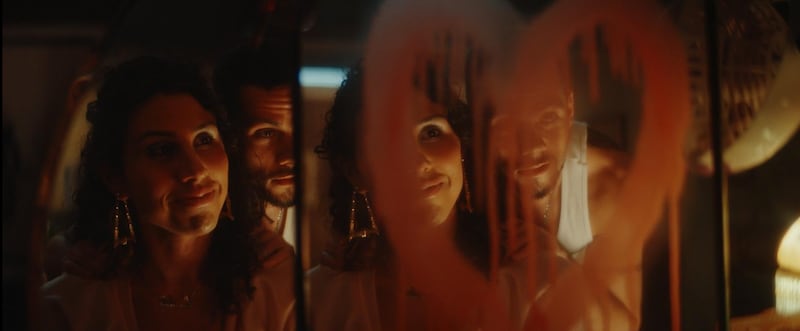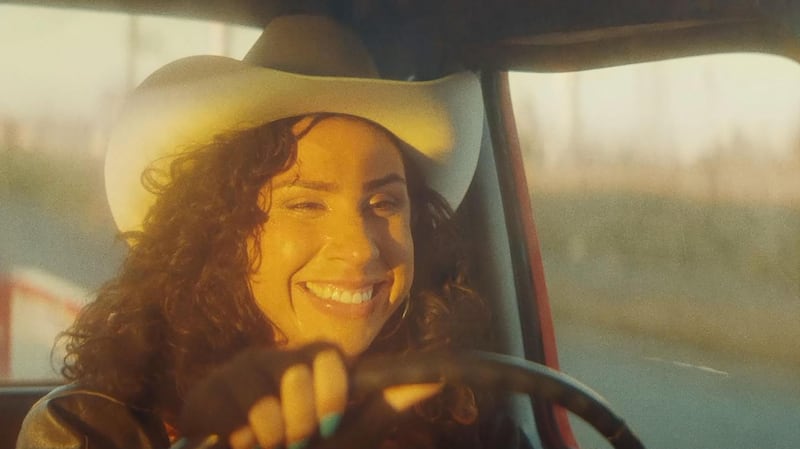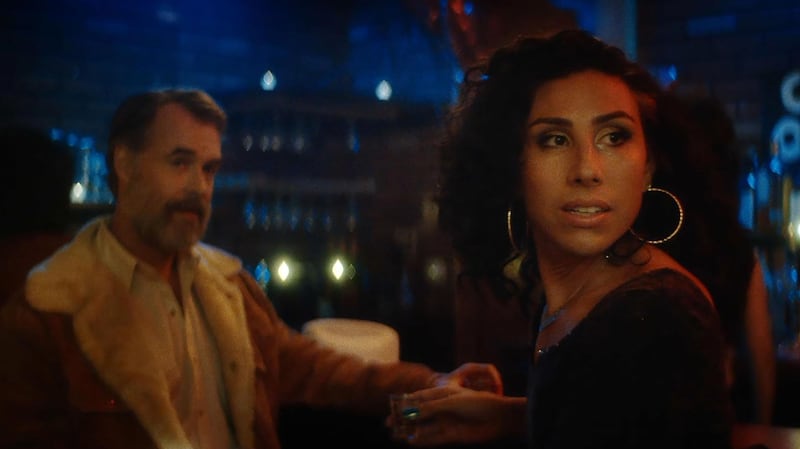“I mean, come on, he can’t even decide if he’s a dude or a chick,” says Vinny (Dylan O’Brien), a New Jersey pimp and small-time drug dealer, in the new crime drama Ponyboi.
He says this by way of dismissing the word of Ponyboi (River Gallo), one of his sex workers, who has told Vinny’s pregnant girlfriend Angel (Victoria Pedretti) that Vinny cheats on her. (Ponyboi knows this in part because he’s among those Vinny cheats with, but nevermind.)
Vinny is more direct about it, but that’s how a lot of the world treats Ponyboi: As someone whose supposed indecision in the matter of gender is a sign of weakness, possibly even an affront to those who have never been forced to give it much thought.
We eventually learn that Ponyboi, like Gallo, is intersex—someone whose biological sex characteristics do not neatly fit into a gender binary. (Gallo uses they/them pronouns, while their character is referred to as male.) Impressionistic flashbacks show that his parents, who emigrated from El Salvador to Jersey, made the decision early on to proceed with a surgery favoring masculinity, making the choice to raise him as a boy.

Ponyboi still clearly reels from this experience. He presents like a trans woman—long hair, makeup, cute outfits, hanging out with cis women—but then, the movie is set in 2002, when he might also be inaccurately tagged as a cross-dresser. He surprises a pharmacist when he reveals the hormone injections he’s looking for are testosterone, not estrogen. He’s not as mixed-up (or dishonest) as Vinny implies, yet his life so far has seemingly left him wary of firmly aligning himself. Self-discovery can be a lot harder with the unsolicited opinions and assumptions of the rest of the world.
Gallo presumably has experience with these conflicts: They also wrote Ponyboi, expanded from a short film. In its feature version, it’s nominally a crime movie, one that’s most compelling when Gallo and director Esten Arango zero in on the difficulties Ponyboi must navigate during an otherwise stock genre situation.
Sometimes this means consigning other characters to hilariously simplified stereotypes: Early on, one of Vinny’s mobbed-up business associates barges into the laundromat where Ponyboi works, yelling about the Jersey traffic he experienced while being forced by his wife to drive back to Fort Lee because he brought home the wrong mozzarella (pronounced “mats-uh-rel,” of course). Later, he has sex with Ponyboi and dies of being a big fat goomba.
OK, technically he dies from a drug shoddily engineered by Vinny, but from the moment the character enters the frame, he’s obviously doomed; Ponyboi is not terrifically inspired in its portrait of the Jersey underworld.

But when Ponyboi takes a suitcase of money from the dead gangster and goes on the run, his personal complications are vividly rendered and implied: Where’s he going to get the hormones he wants to keep taking even if he’s on the lam? Should he turn to his family for help, despite his estrangement from his father, who is now in poor health? (And is now the time to forgive him, or cut him out for good?) What are his loyalties to Angel, whom he has both betrayed and attempted to help?
There is another subplot that generates similar human interest, even as it stands out as perhaps the single least believable element of the film.
Ponyboi keeps running into Bruce (Murray Bartlett), a cowboy-like older gentleman passing through Jersey on his way to Vegas. They take an instant liking to each other, first in conversation at the laundromat (complete with obligatory Springsteen chat) and later when their paths cross again, under more intense circumstances.

Bruce feels like a contrivance—impossibly gentle, curious, and open-minded. Their scenes together, though, provide the most inviting and original element of Ponyboi, because it’s never certain what they’ll reveal to each other or when. Perhaps sensing how unresolvable this relationship feels, Gallo and Arango more or less opt out of it entirely.
Sadly, the movie feels full of opt-out moments. Gallo holds their own on screen, anchoring scene after scene, yet they feel tethered to the bad crime drama and underdeveloped family backstory. O’Brien, meanwhile, confirms that he’s become a surprisingly versatile and daring actor,. But unlike Twinless, his acting triumph coming later this year, this particular movie doesn’t pay off his willingness to go to unexpected places.
The 2002 setting, which at first seems designed to situate Ponyboi in a world (even) less understanding of his defiance of the gender binary, feels undermined by the fact that almost every male character in the movie desires Ponyboi on some level. Even the movie’s neon-drenched visual scheme feels a little like a choice made and forgotten about.
Throughout, Ponyboi mistakes supplying additional information for deepening its characters. It’s too bad, because Gallo has talent and presence. It’s ultimately the movie, not its star or lead character, that feels like a product of muddled indecision.
The post An Intersex Sex Worker Flees the Mob in New Dylan O’Brien Movie ‘Ponyboi’ appeared first on The Daily Beast.




